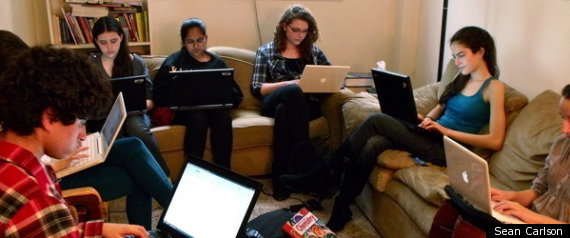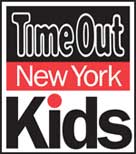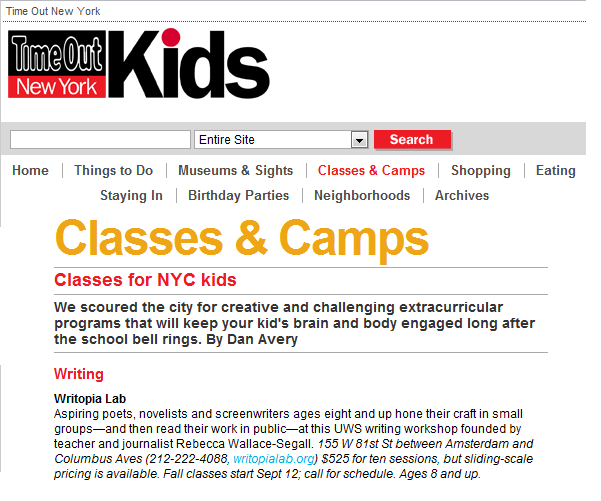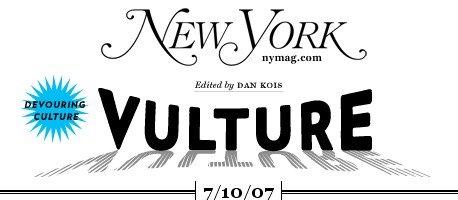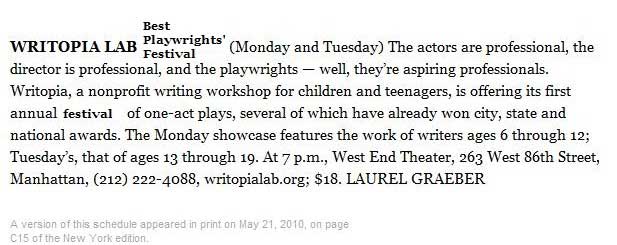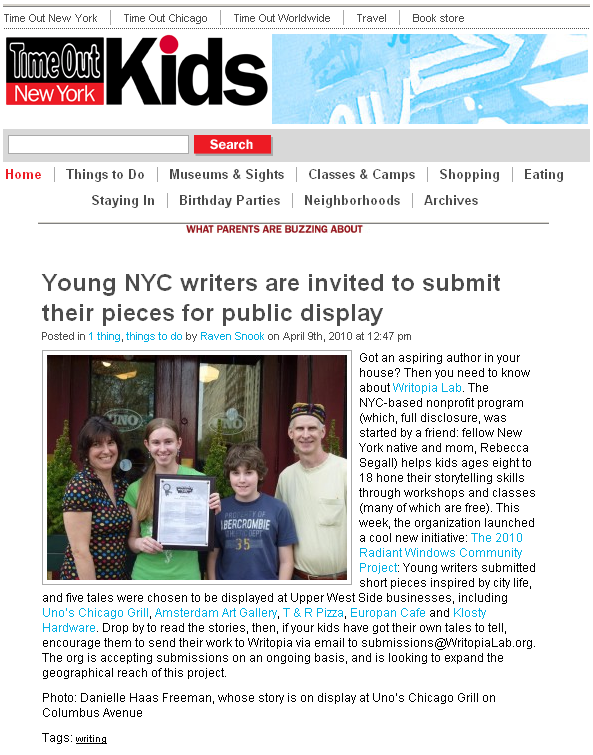April 18, 2011
On Thursday, April 14th, 122 teen writers from Greater Washington — 19 of whom are from Alexandria, were honored at the Rosslyn Spectrum Theatre as regional winners in the Scholastic Writing Awards, the country's largest, longest-running, and most prestigious writing competition for teens.
14 local writers were also celebrated as National Medalists in the competition, which means that they will be honored at Carnegie Hall in New York City on May 31st.New York City Mayor Michael Bloomberg has declared this day Scholastic Art & Writing Awards Day, and the top of the Empire State Building will be lit gold in honor of their accomplishments. Of the 185,000 art and writing submissions received across the country, only 1500 (less than 1%) received National Medals.
Two of these National Medalists live or attend school in Alexandria. Katherine Mitchell, 17, Silver Medalist for her Senior Portfolio of creative writing, lives in Alexandria and goes to the National Cathedral School. Rachel Kim, 17, won a Silver Medal for poetry. Rachel attends Thomas Jefferson High School in Alexandria and lives in Burke.
Throughout the programs 88 year history, this is the first time that the Scholastic Writing Awards has had a presence in Greater Washington. Writopia Lab, a nonprofit organization that holds creative writing workshops for kids and teens, brought the program to the area, with the help of the DC Area Writing Project.
"We are thrilled to bring this outstanding program to Greater Washington, said Kathy Crutcher, DC Director of Writopia Lab.Students who excel in academics or sports have ample opportunities for recognition.This is the chance for talented, creative kids to show their stuff."
Writopia Lab will hold week-long creative writing workshops in Old Town Alexandria this summer for writers ages 8-18. In these workshops, published writers serve as mentors for small groups of 4-6 writers and help them prepare for competitions like the Scholastic Writing Awards and/or to develop their creativity and writing talents.
At the Regional Awards Ceremony, all writers introduced themselves and their awards on-stage. DC area poet and Book-in-a-Day founder Kwame Alexander gave the keynote address, and author Danielle Evans, American University professor of creative writing and one of the Head Judges for the Regional Awards, honored the top regional winners. To close the program, DC actors Catherine Frels and Kait Manning performed dramatic readings of the National Gold Medal winning works.
Regional Award recipients come from public, private, and home- schools throughout the Greater Washington region, which included the District of Columbia; Montgomery County, MD; Arlington County, VA; and Fairfax County, VA. 122 teen writers won 183 regional awards, including 32 Gold Key winning works, which went on to national adjudication. 16 of these works, by 14 different writers, were selected for national awards.
This years National Award recipients from Greater Washingtonare:
- Mary Salmonsen (17), Olney, MD — American Voices Medal
- Sofia Laguarda (12), Washington, DC — Gold Medal
- Lillie Lainoff (15), Washington, DC — Gold Medal
- Maria Brescia-Weiler (14), Washington, DC — Gold Medal
- Andrea Mirviss (18), Potomac, MD — Gold Medal
- Luisa Banchoff (15), Arlington, VA — Gold Medal
- Isaac Stanley-Becker (17), Washington, DC — Gold Medal, Silver Medal
- Annie Rosenthal (13), Washington, DC — Silver Medal
- Christine Miranda (17), Germantown, MD — Silver Medal
- Ruthie Prillaman (16), Potomac, MD — Silver Medal
- Rachel Kim (17), Burke, VA — Silver Medal
- Olivia August (16), Arlington, VA — Silver Medal
- Grace McNamee (18), Bethesda, MD — 2 Silver Medals
- Katherine Mitchell (17), Alexandria, VA (Silver Medal)

These students join the ranks of some of our countrys most revered artists and writers who have received Scholastic Art & Writing Awards when they were high school, including Robert Redford, Andy Warhol, Truman Capote, John Lithgow, Joyce Carol Oates, John Baldesarri, Philip Pearlstein, Zac Posen, Sylvia Plath, Richard Avedon, Robert Indiana and Abdi Farah(winner of the Bravo reality showWork of Art: The Next Great Artist).
Since 1923, the Awards have recognized more than 13 million students and made available over $25 million in scholarships. They continue to be the nations largest source of scholarships for young artists and writers. The program is generously supported locally by Profit Investment Management, Busboys and Poets, and Charles P. Rogers, and nationally by Scholastic Inc., Maurice R. Robinson Foundation, Jack Kent Cooke Foundation, Command Web Offset, AMD Foundation, The New York Times, Dick Blick Co., Ovation, and New York Life Foundation.

